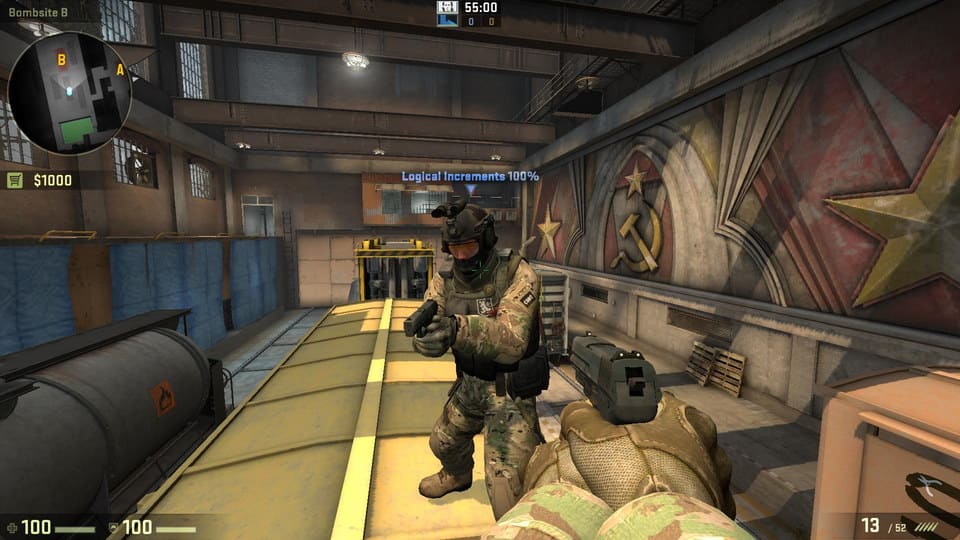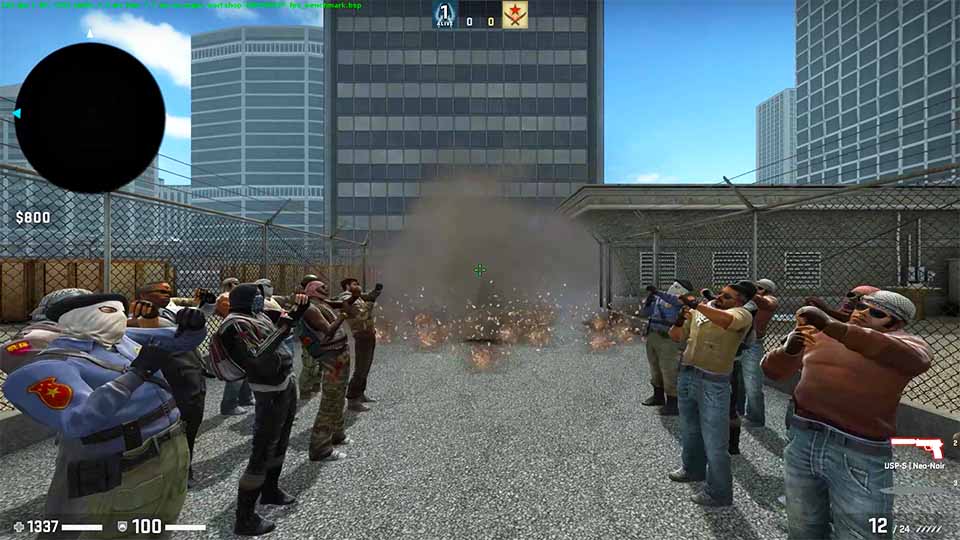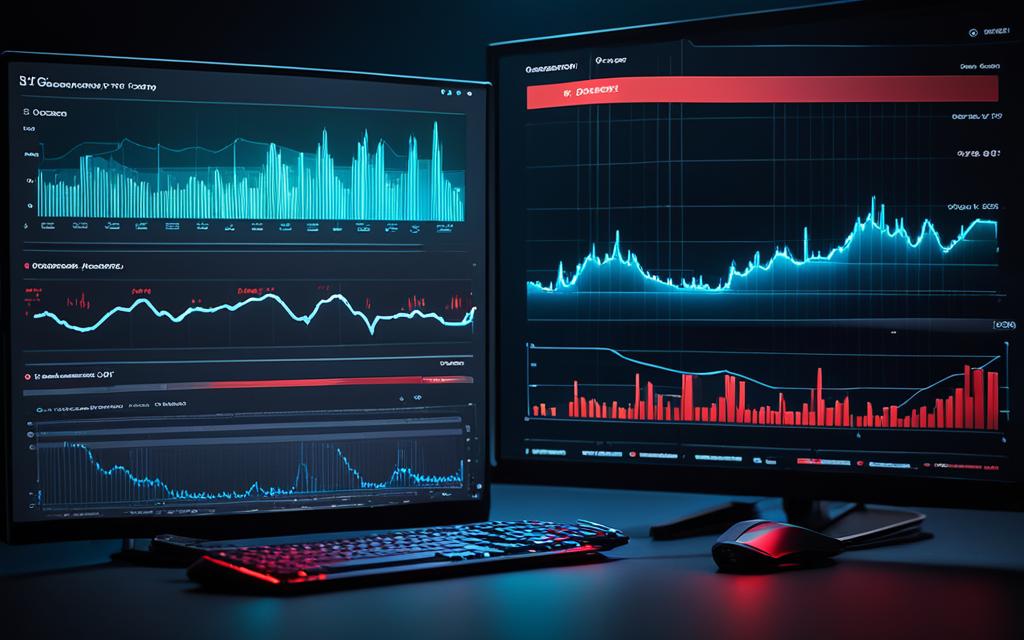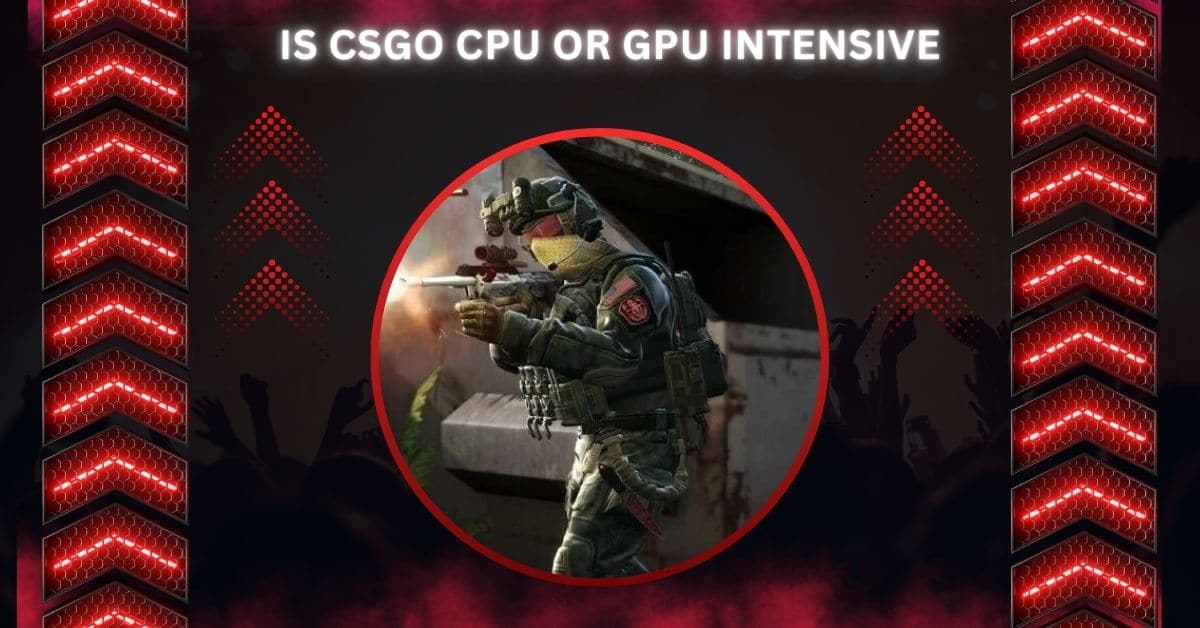CSGO (Counter-Strike: Global Offensive) is more CPU-intensive than GPU-intensive. This means the game relies heavily on your CPU to handle tasks like game physics, player movements, and hit registration.
CSGO is primarily CPU-intensive, relying more on your processor for handling game physics and player interactions. While a decent GPU is needed for smooth graphics, the CPU plays a crucial role in performance.
This article breaks down the role of the CPU and GPU in CSGO and offers recommendations to help you maximize your gaming experience.
Understanding the CPU and GPU Demands of CS:GO
CS relies more on the CPU than the GPU. The CPU handles game logic, like movement and shooting, while the GPU manages graphics.
A strong CPU boosts performance, but a decent GPU still helps with smoother visuals and higher resolutions.
1. The Role of the CPU in CS:GO
CS depends heavily on the CPU for handling game physics, player actions, and other calculations. A powerful CPU improves frame rates, making gameplay smoother and more responsive. A higher clock speed and more cores lead to better performance in CS.
A. CPU Recommendations for CS:GO

Investing in a powerful CPU is crucial to optimize your gaming experience in CS. Here are some top recommendations that provide excellent performance:
- Intel Core i5-11400: Offers great value with strong single-thread performance, ideal for CS.
- Intel Core i7-11700K: A higher-end option with faster clock speeds, providing smoother gameplay at higher frame rates.
- AMD Ryzen 5 5600X: Known for its efficiency and excellent single-core performance, perfect for CS.
- AMD Ryzen 7 5800X: A powerful processor that excels in gaming and multitasking, making it a strong choice for serious players.
These CPUs are designed to handle the demands of CS effectively, giving you the best gaming experience possible. Prioritize single-thread performance and clock speeds for optimal results.
Also Read: Is Wow CPU Or GPU Intensive – A Detailed Guide In 2024!
2. The Impact of GPU on CS:GO Performance
While CS isn’t GPU-heavy, the graphics card still plays a role in rendering high-quality visuals. A mid-range GPU can handle the game at higher resolutions and settings. Even a basic GPU can run CS well for competitive play, focusing on frame rates over visual effects.
A. GPU Recommendations for CS:GO
If you’re looking to upgrade your GPU for better performance in CS, here are some top picks:
- NVIDIA GeForce GTX 1660 Super: This mid-range GPU handles CS exceptionally well, offering solid performance at 1080p.
- AMD Radeon RX 5600 XT: A powerful and efficient option that ensures stable frame rates, even during intense multiplayer matches.
- NVIDIA GeForce RTX 3060: This GPU provides excellent performance for players looking for higher resolution and smoother frame rates.
- AMD Radeon RX 6700 XT: A great choice for players who want to push their graphic settings to the max without sacrificing smooth gameplay.
These GPUs are ideal for CS, especially if you want to boost visual fidelity without breaking the bank.
Other Factors Affecting CS:GO Performance
1. Memory (RAM)
RAM helps CS run smoothly by storing data the game needs quickly. While CS can run on 8GB of RAM, 16GB is better for smoother gameplay, especially if you run other programs simultaneously. More RAM means faster loading and better performance.
2. Storage
Installing CS on a solid-state drive (SSD) speeds up loading times and improves the game’s reaction time. An SSD makes starting the game and loading maps quicker than a regular hard drive (HDD). Upgrading to an SSD can make your overall gaming experience faster and smoother.
3. System Optimization
Optimize your system to get the best CS performance. Keep your drivers updated, close unused programs, and tweak your in-game settings to balance performance and visual quality. Overclocking can boost your CPU and GPU speeds, but be sure your system stays cool.
Also Read: Is Warzone CPU Or GPU Intensive – Key Insights For Gamers!
Does CSGO use CPU or GPU more?
CSGO mainly uses the CPU more than the GPU. The game relies on fast processing from the CPU to handle tasks like player movements and game mechanics, while the GPU handles graphics, which are less demanding in this game.
Upgrade CPU or GPU for CSGO?
If you want better performance in CSGO, upgrading the CPU is usually more beneficial. Since CSGO is CPU-heavy, a faster processor will improve your frame rates and game response, while the GPU plays a lesser role.
Why is CS:GO so CPU-Heavy?
CSGO is CPU-heavy because it relies on the processor to handle complex game mechanics and player interactions. The game’s physics, server updates, and character movements demand more from the CPU than from the graphics card.
Is CS2 still CPU intensive or load balanced to GPU?

CS2 is still CPU-intensive but slightly more balanced with GPU usage than CSGO. However, the CPU still handles most critical game tasks, so a strong CPU is important for smooth gameplay.
CS 2 is so CPU intensive that my GPU became useless
In CS2, the CPU still handles most of the game’s operations, which can make the GPU feel underused. If your CPU is working hard but the GPU seems idle, upgrading the CPU might help balance the load better.
Upgrade CPU/GPU for CSGO First?
For CSGO, upgrading the CPU first is more effective. The game relies heavily on the processor for its performance. A better CPU will improve frame rates and gameplay, while the GPU plays a smaller role in visual performance.
Should I upgrade my CPU or GPU for CS:GO?
Upgrading your CPU is the better choice for CSGO. Since the game is CPU-dependent, a faster processor will give you smoother gameplay and higher frame rates, while the GPU is less important for this specific game.
Must Read: Is Cod CPU Or GPU Intensive – A Deep Dive Into Game Demand
Are games CPU or GPU intensive?
Most games vary in their demands. Some are more CPU-intensive, while others rely more on the GPU. Fast-paced games with heavy game logic (like CSGO) tend to use the CPU more, while graphically rich games rely on the GPU.
Is League of Legends more CPU or GPU intensive?
League of Legends relies more on the CPU than the GPU. It relies on the processor to handle gameplay and mechanics, but it doesn’t require a strong GPU for high-quality performance, making a good CPU more important.
CS:GO needs CPU or GPU?
CSGO primarily needs a strong CPU. The game relies on the CPU to manage its mechanics, player interactions, and overall performance. While the GPU handles graphics, it doesn’t need to be as powerful for good gameplay.
Counter-Strike GO: CPU or GPU Intensive?
Counter-Strike: Global Offensive (CSGO) is more CPU-intensive than GPU-intensive. The game’s mechanics and player interactions rely heavily on the CPU, while the GPU plays a smaller role in delivering visuals and graphics.
Must Read: Is Apex CPU Or GPU Intensive – A Detailed Look In 2024!
Which settings affect my CPU?
Settings like physics, AI, and draw distance affect your CPU. These settings handle game mechanics and how much processing power the CPU needs. Reducing these can help the CPU run more efficiently and boost overall performance.
Is CS2 CPU or GPU intensive
CS2 is more CPU-intensive, similar to its predecessor. The game relies on the CPU for calculations, gameplay mechanics, and interactions. However, a decent GPU is still required to handle higher-quality graphics and smooth gameplay.
Is Valorant CPU or GPU intensive

Valorant is more CPU-intensive. The game prioritizes fast processing for player interactions, hit registration, and gameplay mechanics. A mid-range GPU is enough for decent visuals, but a strong CPU significantly enhances performance in this game.
Is Fortnite CPU or GPU intensive
Fortnite is CPU and GPU intensive, but it leans more toward the GPU for graphics quality. The CPU handles in-game mechanics and processing tasks, but a strong GPU is essential for high visual settings and smooth frame rates.
Is CSGO CPU or GPU intensive for gaming
CSGO is more CPU-intensive. It depends on the CPU for processing game logic, hit detection, and physics, while the GPU manages the graphics. A better CPU can result in improved performance and higher frame rates.
Read It: Why Is Valorant Using So Much GPU – Key Reasons And Fixes!
Is PUBG CPU or GPU intensive
PUBG is CPU- and GPU-intensive, but it leans more on the GPU for graphics rendering. The CPU is still crucial for smooth gameplay, but a strong GPU is required to handle the game’s high visual demands and ensure better frame rates.
GPU Intensive Games
GPU-intensive games include titles like Cyberpunk 2077, Red Dead Redemption 2, and Assassin’s Creed Valhalla. These games require powerful graphics cards to handle the high-quality visuals, lighting effects, and rendering processes for smooth and immersive gameplay.
Guys how do I know if a game is CPU or GPU intensive?
Check if a game has high graphics requirements (GPU) or relies on fast calculations (CPU). Benchmark tests, game forums, and recommended system requirements can also give clues about which hardware component the game uses more.
Why is there no difference in FPS after changing the resolution in CSGO.
CSGO is more CPU-intensive, so lowering the resolution might not impact FPS much. The CPU handles most of the work in this game, and resolution changes mostly affect GPU performance, not CPU-heavy games like CSGO.
Read It: What Is GPU 3D In Task Manager? – Essential Tips For Gamers!
How to make the game more GPU intensive rather CPU intensive
Increase settings like resolution, texture quality, shadows, and anti-aliasing to shift the load to the GPU. Reducing CPU-demanding settings like physics and AI can balance the game’s demands and make it more reliant on the GPU.
FAQs
1. Should I upgrade CPU or GPU for CS:GO?
Upgrade your CPU for CSGO, as it’s more CPU-intensive. A strong CPU improves frame rates and overall performance.
2. Does CS:GO run on GPU?
Yes, CSGO uses the GPU to render graphics. However, its performance mainly depends on the CPU.
3. Does CS:GO run on CPU?
Yes, CSGO heavily relies on the CPU to handle game calculations and physics, which impacts overall performance.
4. Is CS:GO CPU or GPU heavy?
CSGO is more CPU-heavy, relying on your processor for game logic and physics, though a good GPU is still needed.
5. Is a CPU or GPU better for FPS?
For CSGO, a powerful CPU is better for FPS, as the game is more CPU-intensive. A good GPU also helps with smooth graphics.
6. Will a new GPU increase FPS?
A new GPU can increase FPS, but in CSGO, upgrading the CPU will significantly impact performance.
7. Will a new CPU increase FPS?
Yes, a new CPU can significantly increase FPS in CSGO, as the game relies heavily on CPU performance for smooth gameplay.
8. How many FPS is enough for CS:GO?
At least 60 FPS is recommended for CSGO, but higher FPS (e.g., 144 FPS) provides a smoother and more responsive gaming experience.
9. Does CS2 run worse than CS:GO?
CS2 is similar to CSGO but can be more demanding. Performance may vary based on your hardware and settings.
10. Best way I’ve found to massively lower in-game CPU temps without impacting FPS…
Improving cooling with a better CPU cooler and enhancing airflow in your case can lower temps without affecting FPS.
Conclusion
CS:GO is primarily CPU-intensive, relying heavily on your processor for game mechanics and interactions. While a good GPU enhances graphics, upgrading your CPU will have a more significant impact on performance. For the best experience, balance your upgrades to meet CPU and GPU needs.
